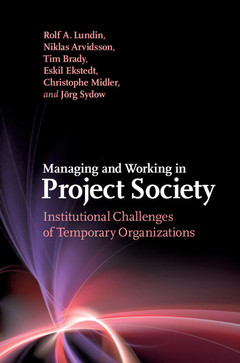Description
Managing and Working in Project Society
Institutional Challenges of Temporary Organizations
Authors: Lundin Rolf A., Arvidsson Niklas, Brady Tim, Ekstedt Eskil, Midler Christophe, Sydow Jörg
A selection of leading authorities on project organizing explore the effects, opportunities and challenges of a project society.
Language: English
Subject for Managing and Working in Project Society:
Approximative price 105.31 €
In Print (Delivery period: 14 days).
Add to cart
Managing and Working in Project Society
Publication date: 07-2015
Support: Print on demand
Publication date: 07-2015
Support: Print on demand
Approximative price 32.87 €
In Print (Delivery period: 14 days).
Add to cart
Managing and Working in Project Society
Publication date: 04-2017
Support: Print on demand
Publication date: 04-2017
Support: Print on demand
Description
/li>Contents
/li>Biography
/li>
In this book, leading authorities on project organizing explore the growing deployment of projects and other types of temporary organizations, with a focus on the challenges created by projectification. The way projects are coordinated and handled influences the success of innovation and change within organizations and is critical for strategic development in our societies, yet it is often at odds with the institutions of traditional industrial society. Drawing on both theoretical perspectives and real-world cases, this book sheds light on the transformation toward a project society and explores the effects, opportunities, and conflicts it has created. As change continues, the authors make a case for renewing institutions and mind-sets and provide a foundation from which to discuss societal changes for the future. This is an invaluable book for researchers and students in project management and organizational theory programs, as well as professionals involved in the management of projects.
Preface: contents in a nutshell; Acknowledgements; 1. Project organizing and industrial organization - transformation dilemmas; 2. Projectification trends and organizational archetypes; 3. Managing in Project Society; 4. Work and employment regimes in Project Society; 5. Institutions and projectification; 6. Trends and theory implications; References; Index.
Rolf A. Lundin is Professor Emeritus of Business Administration at Jönköping International Business School and Courtesy Professor-in-Residence at Umeå School of Business and Economics. He has received several prizes and awards for his research on projects and temporary organizations, including the 2014 Project Management Institute Research Achievement Award. He has published widely, with a concentration on temporary organizations, and has edited numerous special issues of journals focusing on the area of projects. Currently, his main focus is on innovative research on projects and temporary organizations.
Niklas Arvidsson is Associate Professor and Head of the Department of Sustainability and Industrial Dynamics at the Royal Institute of Technology, Stockholm. He has also been working as a management consultant for over five years. His research is focused on innovation, learning and change in organizations and industrial systems, with a particular interest in processes in which currently dominating ideas and practices are replaced by new ones.
Tim Brady is Professor of Innovation in the Centre for Research in Innovation Management at Brighton Business School, the University of Brighton, and Visiting Professor in the Department of Industrial Engineering Management at the University of Oulu, Finland. He was a member of the EPSRC-funded Rethinking Project Management network, and Deputy Director of the ESRC-funded CoPS Innovation Centre. His current research interests include the development of new business models for infrastructure, the management of complex projects and programs, and learning and capability development in project-based business.
Eskil Ekstedt is Professor in Business Administration and Associate Professor in Economic History at Uppsala Universitet, Sweden. He was the founding editor of the Scientific Publication series, Work Life in Transition, and the project leader of several major research programs dealing with knowledge formation, and or
Niklas Arvidsson is Associate Professor and Head of the Department of Sustainability and Industrial Dynamics at the Royal Institute of Technology, Stockholm. He has also been working as a management consultant for over five years. His research is focused on innovation, learning and change in organizations and industrial systems, with a particular interest in processes in which currently dominating ideas and practices are replaced by new ones.
Tim Brady is Professor of Innovation in the Centre for Research in Innovation Management at Brighton Business School, the University of Brighton, and Visiting Professor in the Department of Industrial Engineering Management at the University of Oulu, Finland. He was a member of the EPSRC-funded Rethinking Project Management network, and Deputy Director of the ESRC-funded CoPS Innovation Centre. His current research interests include the development of new business models for infrastructure, the management of complex projects and programs, and learning and capability development in project-based business.
Eskil Ekstedt is Professor in Business Administration and Associate Professor in Economic History at Uppsala Universitet, Sweden. He was the founding editor of the Scientific Publication series, Work Life in Transition, and the project leader of several major research programs dealing with knowledge formation, and or
© 2024 LAVOISIER S.A.S.




